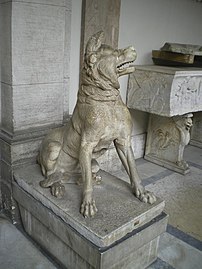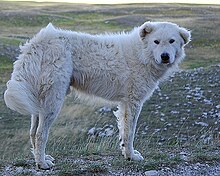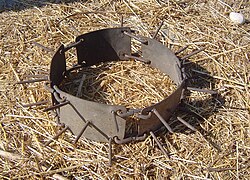Dog breed
| Maremma-Abruzzese Sheepdog | |||||||||||||||||||||||||
|---|---|---|---|---|---|---|---|---|---|---|---|---|---|---|---|---|---|---|---|---|---|---|---|---|---|
 | |||||||||||||||||||||||||
| Other names |
| ||||||||||||||||||||||||
| Origin | Italy | ||||||||||||||||||||||||
| |||||||||||||||||||||||||
| |||||||||||||||||||||||||
| Dog (domestic dog) | |||||||||||||||||||||||||
The Maremmano-Abruzzese Sheepdog (Italian: Cane da pastore maremmano-abruzzese), also known as the Maremmano, Maremma Sheepdog, or Abruzzese Sheepdog (Italian: pastore abruzzese), among other names, is an Italian breed of livestock guardian dog. It is indigenous to central Italy, especially to the Maremma region of Tuscany and Lazio, and to northern areas of Southern Italy, particularly to Abruzzo. It has been used for centuries by Italian shepherds to guard sheep from wolves. The "Maremmano" name derives from that of the Maremma marshlands where, until recently, shepherds, dogs and hundreds of thousands of sheep over-wintered, and where the dogs are still abundant although sheep-farming has decreased substantially. However, the breed is still widely employed in and closely culturally associated with the nearby region of Abruzzo, where sheep herding remains vital to the rural economy and where the wolf (specifically the Apennine wolf) remains an active and protected predator. The “Abruzzese” portion of the dog’s name derives from its ubiquity in Abruzzo and the surrounding area.
It may share a common ancestor with other European breeds of similar appearance and function such as the Pyrenean Mountain Dog, the Kuvasz of Hungary, the Polish Tatra Sheepdog and the Šarplaninac.
History
Ancient history and iconography
Descriptions of white flock guardian dogs are found in ancient Roman literature, in works such as those of Columella, Varro and Palladius. Similar dogs are depicted in numerous sculptures and paintings from Roman times to the present. Among the earliest is the series of large statues (two in Rome, one in Florence, one – the Duncombe Dog – in England) copied from a Hellenistic bronze from Pergamon.
Iconographic sources identified as relevant to the history of the Maremmano include:
- A Hellenistic bas-relief, of which a drawing was published by Max von Stephanitz in 1901
- A votive statuette in the Museo Archeologico of Capua
- A 14th-century mediaeval fresco in the church of San Francesco in Amatrice, at the foot of the Monti della Laga, in the comune of Rieti; the dog wears a roccale
- A 14th-century fresco in Santa Maria Novella, in Florence
- A 'Nativity' of Mariotto di Nardo (active 1394–1424); the dog wears a spiked collar
- Abraham and Lot on their way into Canaan by Bartolo Battiloro, in the Collegiata of San Gimignano
- A detail of the Journey of the Magi to Bethlehem by Benozzo Gozzoli, c.1460
- Rough ink drawings on the maps of the pasture-lands of the Tavoliere di Foggia published in 1686 by Antonio and Nunzio Michele di Rovere
- A seventeenth-century engraving of the Roman campagna by Joannes van den Hecke
- An eighteenth-century maiolica of a bear-hunt by Candeloro Cappelletti (1689–1772) of Castelli, Abruzzo
- Hunting the Wolf by Jean-Baptiste Oudry, 1746, from the collection of Louis XV; the dogs to the left and right of the wolf are described in a catalogue of the museum as "large dog with long hair". Wolf dogs from the Abruzzo were imported into France at about this time. They were used by François Antoine, "Antoine de Beauterne", in his successful hunt for the Beast of Gévaudan in 1765; according to Gobin, under Louis XV (r.1715–1774) the Venerie Royale or Royal Hunt was composed in large part of Abruzzese wolf-dogs and Sicilian mastiffs.
- The cane da lupo or wolf-dog used by Vincenzo Dandolo to defend Spanish sheep on the mountains above Varese
- An illustration in The Penny Magazine (1833)
- An engraving by Arthur John Strutt of a shepherd and his dog in the Roman campagna in 1843
- Several engravings by Charles Coleman in his collection A Series of Subjects peculiar to the Campagna of Rome and Pontine Marshes
-
 Roman copy of a Hellenistic bronze, in the Vatican Museums
Roman copy of a Hellenistic bronze, in the Vatican Museums
-
Mariotto di Nardo, Natività, ca. 1385, showing a white shepherd dog with a spiked collar
-
 Detail of the Journey of the Magi to Bethlehem by Benozzo Gozzoli
Detail of the Journey of the Magi to Bethlehem by Benozzo Gozzoli
-
 "Wolf dogs of the Abruzzi", illustration from the Penny Magazine of 1833
"Wolf dogs of the Abruzzi", illustration from the Penny Magazine of 1833
-
Sheepdog of the Abruzzes (about 1915)
Recent history

The first registration of the Maremmano in the Libro delle Origini Italiano of the Kennel Club Italiano, as it was then called, was of four dogs in 1898. There were no further registrations for many years. In 1940 there were 17 dogs registered. The first standard for the breed was drawn up in 1924 by Luigi Groppi and Giuseppe Solaro.
Until 1958 the Pastore Maremmano, or shepherd dog of the Maremma, and the Pastore Abruzzese, or shepherd dog of the Abruzzi, were regarded as separate breeds. A breeder's society for the Pastore Abruzzese was formed in 1950, and one for the Maremmano in 1953. On 1 January 1958 the breeds were unified by the ENCI, the Ente Nazionale della Cinofilia Italiano, the national dog association of Italy. The explanation given is that a "natural fusion" of the two types had occurred as a result of movement of the dogs due to transhumance of sheep flocks from one region to another, particularly after the unification of Italy. Until 1860, the mountains of the Abruzzo and the plains of the Maremma lay in different countries. While some older publications refer to the Maremmano and Abruzzese as independent breeds combined to create the Maremmano-Abruzzese, it has been noted that the shorter-haired Maremmano was only ever observed during the winter months, when flocks were grazed on their winter pastures on the milder coastal Tuscany, whilst the supposedly longer-bodied Abruzzese was only observed in the summer months, when flocks were grazed in the Abruzzi mountains.

As sheep farming developed into an annual trek or transhumance from mountain grasslands of Abruzzo and Molise (and other parts of central Italy) south to lower pasture land in Puglia, where sheep were over-wintered, the dogs came to play a central role in the centuries-old migration, an annual event vital to Abruzzese culture. Maremmano dogs continue to be widely used by Italian sheep farmers in areas where predation is common, such as the Apennines of central Italy and the open range land of national parks in Abruzzo. The dogs have also been used to guard animals in Australia, Israel and the United States.
Characteristics
The Maremmano has a solid, muscular build, a thick white coat, a large head and a black nose. Dogs weigh some 35–45 kg and stand 65–73 cm at the shoulder, while bitches weigh 30–40 kg and stand 60–68 cm. Some dogs may be considerably larger. The coat is long and thick; it is rough to the touch, and forms a thick collar around the neck. It should be solid white; some minor yellowing may be tolerated. The nose, the lips and the skin round the eyes are black.
The median age at death has been reported as 7.5 years, compared to a median of 10 years for all dogs in Italy.
Use
 A roccale of a different type |
 The roccale or vreccale, a spiked iron collar |
The traditional use of the Maremmano is as a guardian for the protection of sheep flocks against wolves. Columella, writing in the first century AD, recommends white dogs for this purpose, as the shepherd can easily distinguish them from the wolf, while Varro suggests that white dogs have a "lion-like aspect" in the dark. The dogs work in groups; three or four dogs are an adequate defense against wolves and stray dogs. Their function is mostly one of dissuasion, actual physical combat with the predator being relatively rare. Nevertheless, working dogs may be fitted with a roccale (or vreccale), a spiked iron collar which protects the neck in combat. Until cropping became illegal in Italy, the ears of working dogs were normally cropped.
Dogs used for flock protection are placed among the sheep as young puppies – no more than 40 days old – so that they bond with them; human contact is kept to the indispensable minimum. If there are already guardian dogs in the flock, the puppy imitates and learns from their behaviour. The traditional use of the Maremmano is with sheep, but the dogs can form a similar bond with cattle and have been used to protect them. A small number have been used since 2006 on Middle Island, off Warrnambool, in Victoria, Australia, to protect a small population of the Australian little penguin (Eudyptula novaehollandiae) against invasive foxes. In Patagonia they have been used to protect sheep from pumas.
References
- ^ Standard del cane da pastore maremmano abruzzese (in Italian). Milano: Ente Nazionale dell Cinofilia Italiana. Archived 22 June 2016.
- Graeme Barker, Tom Rasmussen (2000). The Etruscans. Wiley-Blackwell.
- George Ancona (1985). Sheep Dog. New York: Lothrop, Lee & Shepard. ISBN 9780688041199.
- Le Origini del cane Pastore - Maremmano Abruzzese (in Italian). Capranica: Circolo del Pastore Maremmano-Abruzzese. Archived 25 August 2016.
- ^ Paolo Breber (1983). Il Cane da Pastore Maremmano-Abruzzese, second edition (in Italian). Firenze: Olimpia.
- Max von Stephanitz (1901). Der deutsche Schäferhund in Wort und Bild: Herausgegeben im Auftrage des Vereins für deutsche Schäferhunde (in German). Augsburg: Lampart.
- F V (1855). Guide through the galleries of paintings of the Imperial museum of the Louvre. Paris: De Soye and Bouchet, page 620, entry 387
- Alphonse Gobin (1869). Traité pratique du chien; histoire, races, emploi, hygiène et maladies in French). Paris: Mme Ve. Bouchard-Huzard; cited by Breber (1983), page 27.
- Vincenzo Dandolo (1804). Del governo delle pecore spagnuole e italiane e dei vantaggi che ne derivano (in Italian). Milano: L. Veladini; cited by Breber (1983), pages 173–175.
- Charles Knight (editor) (1833). Penny magazine of the Society for the diffusion of useful knowledge, volume 2. London: Charles Knight.
- Charles Coleman (1850). A Series of Subjects peculiar to the Campagna of Rome and Pontine Marshes, designed from nature and etched by C. Coleman. Rome: .
- Franco Simoni (1987). "Storia ed etimologia" (in Italian), in: Fiorenzo Fiorone (1987). I pastori italiani: il maremmano-abruzzese e il bergamasco. Milano: De Vecchi Editore. ISBN 9788841223161.
- Raymond Coppinger, Lorna Coppinger (2002). Dogs: A New Understanding of Canine Origin, Behavior and Evolution. Chicago: University of Chicago Press. ISBN 0226115631
- David Hancock (2014). Dogs of the Shepherds: a Review of the Pastoral Breeds. Ramsbury, Marlborough, Wiltshire: The Crowood Press Ltd. ISBN 9781847978080.
- ^ Robin Rigg (2001). Livestock guarding dogs: their current use world wide. IUCN/SSC Canid Specialist Group Occasional Paper No. 1. Tubney, Oxford: IUCN/SSC Canid Specialist Group. Archived 30 June 2007.
- Cane da pastore Maremmano Abruzzese - Lo Standard (in Italian). Capranica: Circolo del Pastore Maremmano-Abruzzese. Archived 31 October 2017.
- Mariana Roccaro, Romolo Salini, Marco Pietra, Micaela Sgorbini, Eleonora Gori, Maurizio Dondi, Paolo E. Crisi, Annamaria Conte, Paolo Dalla Villa, Michele Podaliri, Paolo Ciaramella, Cristina Di Palma, Annamaria Passantino, Francesco Porciello, Paola Gianella, Carlo Guglielmini, Giovanni L. Alborali, Sara Rota Nodari, Sonia Sabatelli, Angelo Peli (2024). Factors related to longevity and mortality of dogs in Italy. Preventive Veterinary Medicine. 225: 106155. ISSN 0167-5877. doi:10.1016/j.prevetmed.2024.106155.

- cited in: Raymond Coppinger, Lorna Coppinger (2002). Dogs: A New Understanding of Canine Origin, Behavior and Evolution. Chicago: University of Chicago Press. ISBN 0226115631, page 120.
- ^ Caratteristiche del Cane da difesa del gregge (in Italian). Capranica: Circolo del Pastore Maremmano–Abruzzese. Archived 5 November 2013.
- ^ L'Allevamento del Cane da difesa del gregge (in Italian). Capranica: Circolo del Pastore Maremmano–Abruzzese. Archived 5 November 2013.
- Raymond Coppinger, Lorna Coppinger (1995). Interaction between livestock guarding dogs and wolves. In: Ludwig N. Carbyn, Steven H. Fritts, Dale R. Seip (editors) (1995). Ecology and Conservation of Wolves in a Changing World. Edmonton, Alberta: Canadian Circumpolar Institute, University of Alberta. ISBN 9780919058927, pages 523–526.
- Penguin numbers up after world-first maremma trial - 13/12/2006. Warrnambool City Council. Archived 27 September 2007.
- (25 June 2010). National Landcare Winners 2010. ABC Rural. Archived 28 June 2010.
- Liam Miller (3 July 2021). Lights, dogs, action! Patagonia project to keep pumas from preying on sheep. The Guardian. Accessed July 2021.
| Dog breeds of Italy | |
|---|---|
| Hounds | |
| Gundogs | |
| Pastoral dogs | |
| Mastiffs | |
| Miscellaneous | |